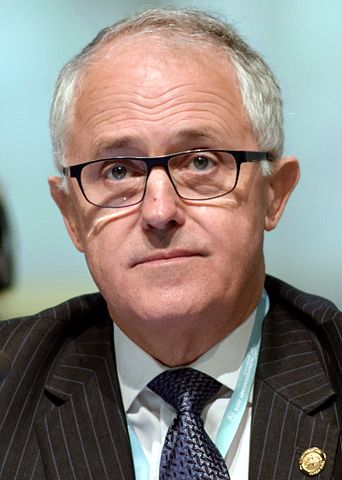 Multi-millionaire former banker Malcolm Turnbull was sworn in Tuesday as Australia’s fourth prime minister in just over two years, promising to create a dynamic new economy and end the divisive approach of his predecessor.
Multi-millionaire former banker Malcolm Turnbull was sworn in Tuesday as Australia’s fourth prime minister in just over two years, promising to create a dynamic new economy and end the divisive approach of his predecessor.
Turnbull, unlike the ousted Tony Abbott, is a moderate on social issues who supports gay marriage and making Australia a republic — positions at odds with some members of his conservative Liberal Party.
“We are living in the most exciting times to be an Australian,” Turnbull told legislators, less than a day after toppling Abbott 54-44 in a dramatic party vote.
“An Australia which succeeds in remaining a high-wage, generous social-welfare-net economy, which should be our goal, must be agile, must be dynamic, it must be looking to the future… and that requires confidence and leadership.”
The economy is slowing as a decades-long mining boom fades.
Abbott’s ousting late Monday further enshrined a recent Australian tradition to swiftly remove ailing prime ministers.
He slammed the frequent leadership changes as a “revolving door” not good for the country.
Turnbull, a suave ex-barrister and journalist, has vowed repeatedly to run a government based on collaboration, in contrast to Abbott’s divisive personalised rule marked by frequent gaffes.
“Cabinet government is a collective method of making decisions,” the 60-year-old told MPs. “I will lead a traditional cabinet government.”
Abbott lashed out at the savage nature of modern politics after his sudden toppling by his long-time Liberal Party colleague and rival — who served as communications minister before making Monday’s challenge.
“The nature of politics has changed in the past decade. We have more polls and more commentary than ever before, mostly sour, bitter character assassination,” he told a farewell press conference.
Abbott won the general election in September 2013 but his first budget, laced with harsh cuts to public services, proved highly unpopular.
The 57-year-old faced a leadership challenge in February after poor polling and a series of gaffes ignited a backbench revolt, but survived.
But he failed to turn around the polls, bolster the economy or stop damaging internal leaks, and lost party support.
– New blood –
Turnbull, with strong backing from influential Foreign Minister Julie Bishop who was re-elected as deputy leader by a 70-30 vote, is expected to shake up the cabinet later this week.
The new leader, expected to sweep out traditional conservatives and bring in younger blood and more women, moved quickly to scotch any expectation of an early national election to cement his leadership.
Turnbull has so far focused his sights on reframing the debate about Australia’s economy and communicating policies better — one of the criticisms levelled at Abbott’s administration.
The economy has slowed over the past year as the nation struggles to transition away from the mining-led growth that helped the country avoid recession for 24 years.
Unemployment is hovering around a decade-high, wages growth is subdued and government revenue has been hit by slowing commodities demand from China, Australia’s largest trading partner.
Nick Economou, senior lecturer in politics at Monash University in Melbourne, said it was too early to say whether Turnbull would be able to charm the electorate and turn around the government’s fortunes.
“A lot depends on the economic argument he intends to make,” he said.
“I think there is a real danger for Turnbull here because… the problem in the Australian economy is the mining boom is over, government expenditure is outstripping revenue-raising and he will face the same problem that Tony Abbott faced.”
Turnbull, ousted by Abbott as Liberal Party leader in 2009 over his support for the previous Labor government’s carbon emissions trading scheme, also said there would be no change to Australia’s climate policy.
With its heavy use of coal-fired power and relatively small population of 23 million, Australia is considered one of the world’s worst per capita greenhouse gas polluters.
Canberra’s target for reducing emissions by 2030 have been criticised as well below the level required by the government’s own advisory body, the Climate Change Authority.
Turnbull is also a supporter of same-sex marriage, unlike Abbott, but told parliament his Liberal-National coalition would continue his predecessor’s plan to hold a plebiscite after the next election.



